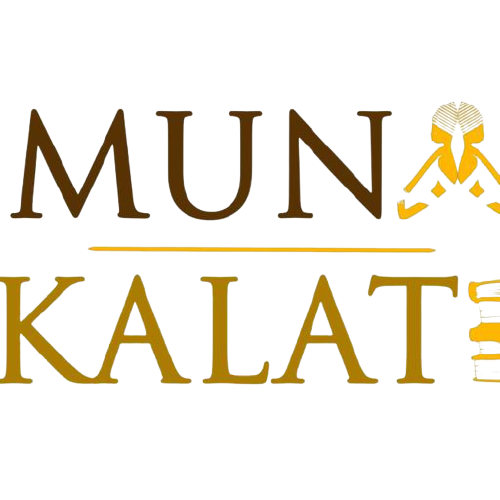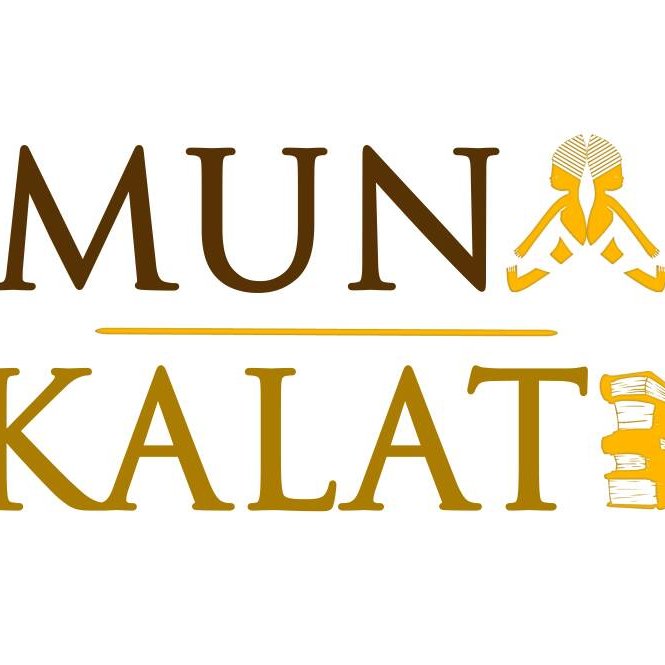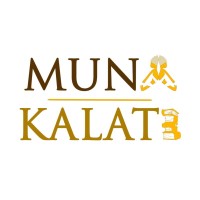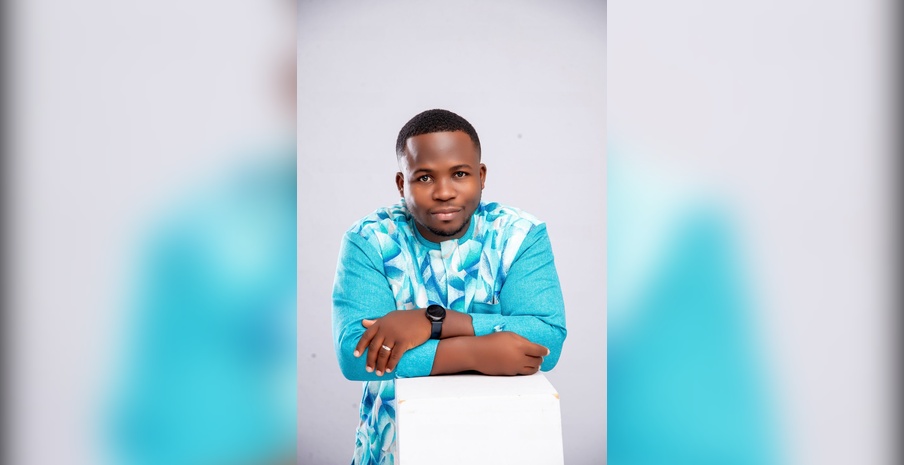Dennis Agyeman who writes his books with the pseudo name Dennis Mann is a banker by profession. He also possesses an in-depth knowledge in forex trading and Crypto currency. His calling as an author of children’s books and his love to create an inclusive education for all children is a story worth reading. Join us as we embark on this wonderful journey with Dennis Mann.
Muna Kalati: What were your hobbies as a child? Did you love reading, particularly African children’s books? What genres did you like most? Did your hobbies influence your career choice?
Dennis Mann: I can only wish I read as many books when I was a little child as Matilda did in Roald Dahl’s book. I came from a family where storybooks were considered a luxury. We see and hear story books and we wish we had those books to read. On the contrary, reading was something far off from my interest. Not until late 2011, I was arrested in a dream where I captured a full story. I woke up and I began writing. Before I knew it, I was done with a story. That feeling was beautiful. But I had to sharpen my skills, I had to revisit all the books I wished I had read when I was a child and read them all. It took me ten years before I finally published my first book – Mr Pee Pee: Kojo Brown visits Land of Pie.
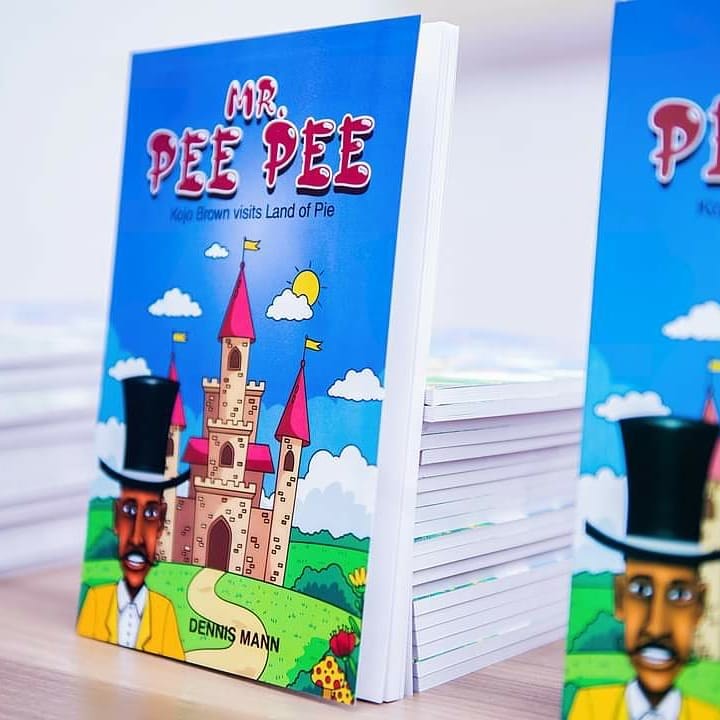
DM: In my journey of learning, I read many kinds of books and I found a love for the adventure/fantasy genre. It is no wonder my first and second book is from this same genre. The second published work is Berganda: My Forest, My Home.
I also write for adults. I have written chick-lit drama, and crime/mystery but they are yet to be published. Writing as a career in this part of the world is difficult. We are not privileged in the western world where a publishing house accepts manuscripts and all work is done. Here you must do everything on your own from publishing to marketing.
MK: How was parenting? Were you given that opportunity to express yourself, develop creativity skills and generally do what you loved? What was it about nurturing the child that you sought to change?
DM: I never saw myself given that opportunity to express myself as I ought to. The African system was prim and proper. Go to school. Get a Job. Get Married and Give Birth. I didn’t enjoy the creativity I should have had as a child and I feel a void within me. Even today, I don’t know how to ride a bicycle. I wasn’t given books that will open my mind to the possibilities and to the other crazy world out there, books that will make you dare to dream.
Sadly, I had to do everything on my own while growing up. I learned the hard way. My both parents passed away so I was given no choice but to learn fast. When I was done with my Tertiary education, I knew I had to work twice as hard to get a job as fast as possible to feed myself as I didn’t have some rich uncle waiting to provide for my needs.
There is a void begging earnestly to be filled by the African child. That void of expressing themselves in books. That experience in seeing the world differently. Such experiences can only be revealed to children through books. I did my national service in a remote village in the western region. I was so surprised to see girls in their teens all carrying pregnancy. When I inquired about the trend that was going on, a reply I got was that the only form of entertainment for these kids was sex. It was heartbreaking to notice that the very little children of our future generation who are supposed to be determined, poised and daring to cause a change only care about bringing forth a child in their sixteen and seventeen.
MK: Is it your quest for a change that informed your decision to become an author of children’s books and also a promoter of reading?
DM: No. It all happened coincidentally. I never saw myself as an Author. Quite frankly, God is indeed a man with a great sense of humor. His timings are different and that was exactly my story. Being hit with a dream led me to start writing and ever since then, I see and dream stories. I receive inspiration from conversations, movies and anything. I don’t force myself to write. I write because it’s intriguing and fun to me. I believe this talent should be used to write for kids who deserve to have a light to shine on their heads, to illuminate their paths. Who knows? My story could inspire someone to grow and become an influential person in society and not succumb to the challenges of life in our circle.
MK: How many children’s books have you published so far? Could you name them? Would you like Muna Kalati to review these books? What inspired you to write your book, Mr. Pee Pee? What part of the book was the most fun to write?
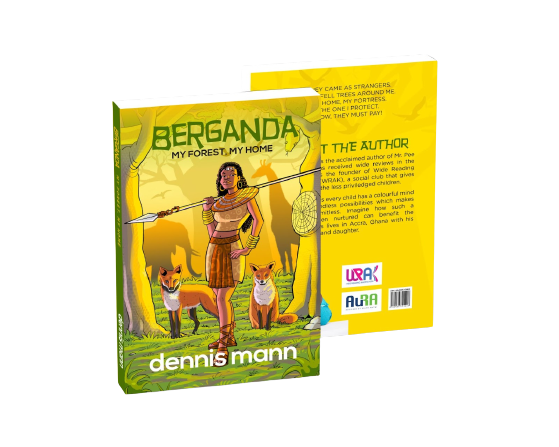
DM: I have published two children’s books namely; Mr Pee Pee and Berganda: My forest, My Home. Yes, I will surely love for Muna to review my books and I would like to hear your honest opinion about them.
Mr Pee Pee came from a What-If scenario question. As children tend to bed-wet a lot, what if it wasn’t the children’s fault but someone who always claims the pee-pee for some sort of energy? A-ha. A story idea. That was how Mr Pee Pee came to light. It’s a story about Kojo Brown who stopped bed-wetting at the age of eleven. Finally, he is now a man but sadly, Mr Pee Pee, the antagonist, wasn’t happy with this new development. He sought to find out from Kojo why he had stopped visiting his castle and perhaps if Kojo could recruit more children to bed-wet.
MK: What would you say is your interesting writing quirk? How did you develop the love for writing? Is it something you do easily? What writing tips would you love to share with us
DM: Well, I would say everyone has something that works for them. I work better under deadlines. Without deadlines, a book can be pending for weeks. I write different books simultaneously. When my hands itch to write a story I can begin and never stop until I am done. Some stories too need proper analytical planning, outlining and research. For example, I am working on a novel titled “Kenya” and this book has taken five years and still counting, I am stuck somewhere on page 76. I can also finish a story within 3 weeks of constantly writing. I did that feat with this book “Nancy Nightmare,” a crime fiction story. In addition, a good story that takes a while to incubate comes out better than books that are rushed.
MK: You have been an advocate for reading and you have actively been creating opportunities for children from deprived backgrounds. Could you please tell us about Wide Reading Among Kids and the projects you have been running?
DM: Yes, please. The reading culture in this generation is declining fast with the advent of social media. I have people who sought to know how I am coping in this industry because they know it is difficult to thrive in this industry. Wide Reading Among Kids was born to fill a gap where kids are reminded of the importance of reading and exposing our little pearls to imagination. It is through imagination that forms our thoughts.
Wide Reading Among Kids is a social club that seeks to give free books to children who can’t afford to pay for a book. In 2021, we took the train to the suburb of Teshie, Accra and we had a jolly time with the kids as we read from the books and also shared the importance of reading with them. This year, we took the train to Tembisa, a suburb in Johannesburg, South Africa. Next year, we are believing in God on our side, we will continue to share books with kids.
MK: From the perspective of an author, what do you think policy makers should do in order to support the African children’s literature industry?
DM: The creative industry is dwindling in Ghana. We need a serious financial injection into this industry. We need more production houses rising to take up new challenges. We can count the number of movie productions we have in Ghana. We should see more appreciation for Writers and calls for Writers to submit their work. We have Writers all around but the situation in our country has caused everyone to crawl into their nest and pursue a 9 to 5 day job.
MK: What challenges have you faced as an African author and how have you been able to overcome them?
DM: As an African author, the major underpinning monster is finance. I spent around fifteen thousand Ghana cedis producing 1,000 copies of Mr Pee Pee in 2021. After this, I must now think of how to sell these books and recover my money. It is hard! You must have a deep passion for writing in Africa to be able to publish your book as it is never easy.
There are writers out there as well who want to publish but they don’t know how to even start. That is why it is necessary to have a mentor. I did this and it worked for me. I joined Rain Foundation under the leadership of Author Ralph, a man who has published over 60 books and is indeed someone who can impart knowledge. I have learned so much from him and that was how I was able to publish two children’s books in one year.
MK: What do you think should be done in today’s tech paced world to encourage African children to read?
DM: More work needs to be done in schools. Encouragement and inclusion of story books in pupils’ curriculum to expose these young ones to reading. It shouldn’t be just for Literature students. Every student needs to be reading to help them grow their vocabularies.
At home as well shouldn’t be left out. Parents need to encourage their wards to read. Also implementing the tactics of delayed gratification whereby children are awarded for finishing a book. In my early years as a child, I was never privy to the opportunity of my parents giving me a book to read.
MK: What is your vision for the future of children’s literature in Ghana and beyond?
DM: I remember sending my books to a school for them to adopt and sell to their pupils. I kept bargaining with this woman on the right amount to take my books and she made a funny comment that what at all is so different from my books, that isn’t it just a story with some pictures in it?
My dream for children’s literacy should be embraced and welcomed. A culture that appreciates arts and a good creative story would help reshape our ideals and foundation. Children’s literacy is not regarded and no value has been placed on children’s books after toiling to write and illustrate for our young ones. A beautiful future where children writers are sought after for content is what I hope for. There is a rising trend now for children’s videos. Cocomelon on Youtube has over 4 Million subscribers and most of these subscribers don’t even have a mobile phone.
Children writers should adopt this trend by converting their stories into digital videos and uploading them on Youtube. Quite frankly, I just had this idea and I should look critically into this industry and see how I can tap.
MK: If granted the opportunity to write a book with one African children’s book author who would that be and why?
DM: I have admired Portia Dery from afar. Portia Dery is a writer from Ghana who is best known for her children’s stories but she also writes short stories and poetry. Her works have been published in various magazines, anthologies and platforms, including the UK poetry library, Arts Beat, Africa’s first anthology, and the Ayiba magazine. She is an embodiment of many things I wish to become. She has achieved so much as a young writer. In 2016, Portia Dery received a fellowship from the Mandela Washington Fellowship for Young African Leaders Initiative, among other things.
In addition to her would be Meshack Asare. A grandfather, a body of art and a wealth of knowledge. I admire Meshack Asare for the feat he has achieved. He was announced as a finalist for the prestigious international award, the 2015 NSK Neustadt Prize for Children’s Literature, which he won on 24 October 2014, becoming the first African to receive the award.
MK: Any last words?
DM: Thank you for reading my short interview. If you are an aspiring writer, please don’t give up. Know that someone out there is waiting for your light to shine on them which would activate their blessings or inspiration. Liaise and connect with other writers as a mentor who have published already and learn from them.
As a parent, please imbibe the culture of reading to your little ones. Let’s make reading fun for them and not some exercise to just pass by. They should see themselves in the stories.
Thank you.
